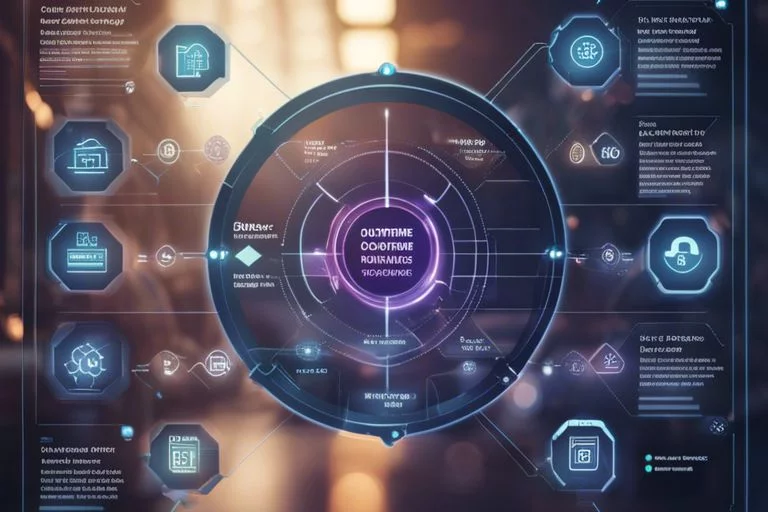In today’s digital age, the world of marketing is rapidly evolving, and staying ahead of the competition means embracing the latest innovations. Enter Artificial Intelligence (AI)—a game-changer that is transforming how businesses connect with consumers.
Imagine having the ability to predict customer behavior, personalize interactions, and optimize campaigns with unprecedented precision. AI empowers marketers to make data-driven decisions, tailoring strategies to meet the ever-changing demands of the market.
From chatbots enhancing customer service to AI-driven analytics providing actionable insights, technology is reshaping marketing landscapes. It’s no longer just about reaching the masses; it’s about engaging them more effectively.
Discover how integrating AI into your marketing strategy can elevate your brand, drive growth, and foster stronger connections with your audience. Strap in as we explore the dynamic intersection of AI and marketing, where innovation meets opportunity.
Understanding AI in Marketing
AI in marketing isn’t as complex as it sounds. At its core, AI leverages data, algorithms, and machine learning to mimic human decision-making and improve marketing efforts.
One major component is data analysis. AI sifts through massive amounts of information, uncovering patterns and trends that would take humans exponentially longer to identify. With these insights, marketers can craft more effective campaigns that reach the right audience at the right time.
Another exciting aspect is personalization. AI excels at understanding individual consumer preferences, allowing brands to offer tailored experiences. Whether it’s personalized recommendations or targeted ads, AI makes consumers feel seen and understood, boosting engagement and loyalty.
AI also enhances efficiency through automation. Mundane tasks like scheduling social media posts or managing email marketing campaigns can be handled with minimal human intervention, freeing up time for strategic planning and creative pursuits.
Coupled with this, AI-driven tools like chatbots are redefining customer interactions, providing instant support and fostering positive experiences—every marketer’s dream.
Understanding AI’s capabilities opens up a world of possibilities, positioning your marketing strategy at the cutting edge of innovation and customer satisfaction.
Benefits of Implementing AI in Marketing
Incorporating AI into your marketing strategy offers numerous advantages that can significantly enhance your business performance. With AI, your marketing becomes faster, more efficient, and incredibly precise.
Enhanced Data Analysis
AI enables marketers to delve into vast datasets quickly, revealing insights that are critical for informed decision-making. This analysis allows for more effective targeting and messaging, ensuring campaigns resonate with audiences.
Additionally, AI’s ability to personalize marketing efforts is transformative. By predicting consumer needs and preferences, AI helps create customized experiences that increase customer loyalty and drive sales.
Another significant benefit is cost efficiency. AI-powered tools automate labor-intensive tasks, reducing operational costs and allowing teams to focus on more strategic activities that require human creativity and judgment.
AI also streamlines campaign management. With real-time data analysis, marketers can adjust strategies on the fly, optimizing performance and maximizing return on investment.
Finally, AI enhances the customer experience by providing immediate, personalized interaction through chatbots and automated messaging, leading to higher satisfaction rates and stronger brand-consumer relationships.
By embracing AI, marketers unlock a new realm of possibilities, driving strategic growth and mastering the art of audience engagement.
AI Tools to Enhance Your Marketing Strategy
Maximizing the potential of AI in marketing begins with selecting the right tools. These tools streamline operations, enhance personalizations, and drive results.
Predictive Analytics Platforms
AI-driven predictive analytics platforms are vital for forecasting consumer behavior and trends. By analyzing historical data, these platforms allow marketers to anticipate what products or content will engage their audience, thereby refining strategies for optimal impact.
Chatbots have become indispensable for modern marketing. These AI tools provide 24/7 customer support, answer queries in real-time, and guide consumers through purchasing decisions with ease, improving user experience and increasing conversions.
In the realm of content creation, AI-powered tools are revolutionizing production. They assist in generating ideas, automating repetitive tasks, and optimizing content for SEO, saving time while enhancing creativity and reach.
AI-based social media management tools also play a significant role. They offer automated scheduling, trend analysis, and even audience engagement recommendations, ensuring that brands maintain a strong presence across platforms.
Adopting these AI tools can transform your marketing strategy into a powerful, data-driven approach, paving the way for innovation and sustainable growth.
Personalization and Targeting with AI
AI is revolutionizing how marketers approach personalization and targeting, making interactions more meaningful and relevant. By analyzing vast amounts of customer data, AI uncovers insights that help tailor experiences to individual preferences.
With AI’s ability to segment audiences, marketers can craft messages that resonate on a personal level. This level of specificity means customers are only targeted with products or services they’d likely enjoy, increasing engagement and conversion rates.
Dynamic Content Customization
Dynamic content powered by AI takes personalization a step further. Websites and emails can automatically adjust content based on user behavior and past interactions, delivering an experience unique to each visitor. This not only captures attention but also builds lasting connections.
AI also enhances retargeting strategies. By tracking customer behavior, AI can refine how, when, and on what platform to engage users who showed interest but didn’t convert initially. This precision targeting softly encourages potential customers back to your site to finalize their decisions.
Furthermore, AI-driven personalization fosters brand loyalty. Customers appreciate when a brand understands and anticipates their needs, thus promoting a positive brand experience. As a result, personalization with AI is not just a strategy—it’s a competitive advantage in today’s market.

Measuring AI Success in Marketing Campaigns
To fully harness AI’s capabilities, understanding how to measure its success in your marketing campaigns is crucial. Setting clear objectives is the foundation of effectively evaluating AI-driven strategies.
Key performance indicators (KPIs) are indispensable tools for tracking success. Increased conversion rates, enhanced engagement metrics, and improved customer satisfaction scores are all indicators of AI effectiveness. By closely monitoring these numbers, you can assess how well AI tools are driving your marketing goals.
Analyzing ROI is another vital aspect. Compare the cost savings from automation and increased revenue from AI-driven personalization against your investment in AI technology. A positive ROI indicates your campaign is on the right path.
Continual testing and optimization are essential for maximizing AI potential. A/B testing different approaches allows marketers to see what resonates best with audiences, leading to data-backed decisions that refine ongoing strategies.
Always keep an eye on the bigger picture. AI not only impacts specific campaigns but also enhances overall brand perception. Regularly gathering customer feedback will help gauge how AI influences brand interactions and loyalty.
By systematically measuring these elements, you can ensure your AI-driven marketing campaigns not only meet but exceed your strategic objectives.
Future Trends and Innovations in AI Marketing
AI continues to evolve, paving the way for exciting trends and innovations that will shape the future of marketing. Keeping an eye on these developments will help marketers stay ahead of the curve.
One such trend is the rise of voice and visual search. As consumers increasingly rely on voice-activated devices and image-based searches, AI is expected to play a crucial role in optimizing content for these platforms, driving more personalized and efficient search experiences.
The Expansion of Augmented Reality
Augmented Reality (AR) is revolutionizing brand interaction, with AI enhancing these experiences by providing real-time data that enriches user engagement. This trend promises to create more immersive and interactive marketing campaigns that captivate audiences.
Hyper-personalization is set to take center stage. As AI technologies become more sophisticated, the ability to offer highly tailored experiences at scale will transform how brands connect with consumers, fostering deeper and more meaningful relationships.
Additionally, advances in sentiment analysis will allow marketers to better understand consumer emotions and respond in ways that feel more human. This insight ensures brands are not just seen but felt in a more authentic manner.
AI’s continual evolution means the marketing landscape will keep shifting, offering endless opportunities for innovation and competitive differentiation. Embracing these future trends will ensure your marketing strategy remains dynamic and inspired.
The Bottom Line: Driving Marketing Results with AI
As we navigate the rapidly changing digital landscape, integrating AI into marketing strategies is no longer a luxury but a necessity. Harnessing AI’s power revolutionizes how businesses operate, allowing more informed, efficient, and personalized marketing efforts.
By leveraging AI tools, marketers can analyze data like never before, gaining insights that drive smarter decisions. This data-driven approach enables businesses to tailor their campaigns to meet customer needs precisely, increasing engagement and conversion rates. Additionally, the automation of routine tasks through AI frees up valuable time, allowing creative teams to focus on crafting innovative campaigns.
And with that in mind, personalization has become the cornerstone of effective marketing. AI’s capacity to predict consumer behavior and preferences means that brands can offer experiences that resonate on a deeper level. This enhanced connection not only drives sales but also builds customer loyalty, ultimately leading to sustained business growth.
Looking to the future, staying ahead requires an understanding of emerging AI trends. Whether it’s adapting to voice and visual search or experimenting with augmented reality, embracing these innovations will set brands apart in a competitive market.
In summary, AI offers endless possibilities for advancing marketing strategies. As you incorporate these technologies, you’re not just improving your campaigns; you’re building a foundation for ongoing success. The bottom line is clear: AI isn’t just a tool—it’s an essential partner in driving impactful marketing results.
















